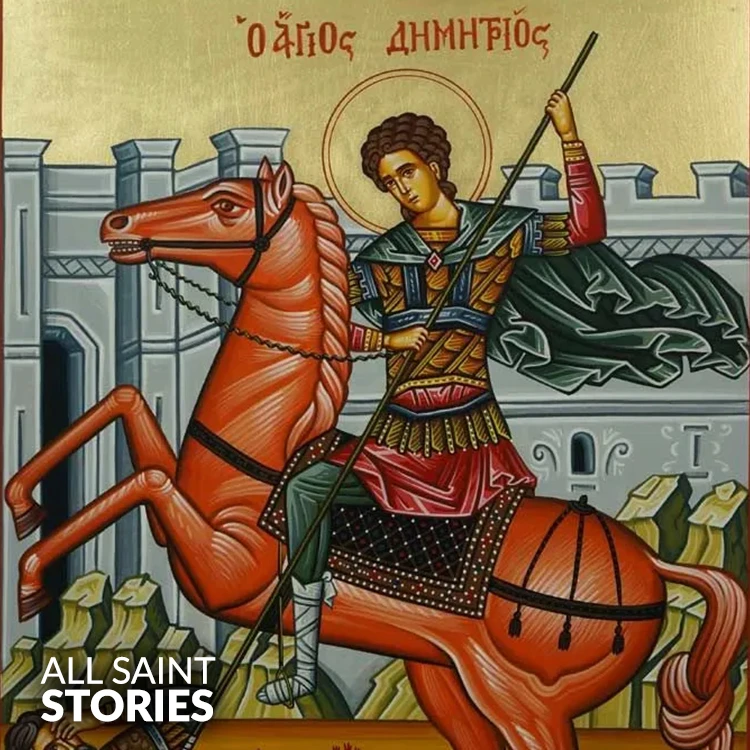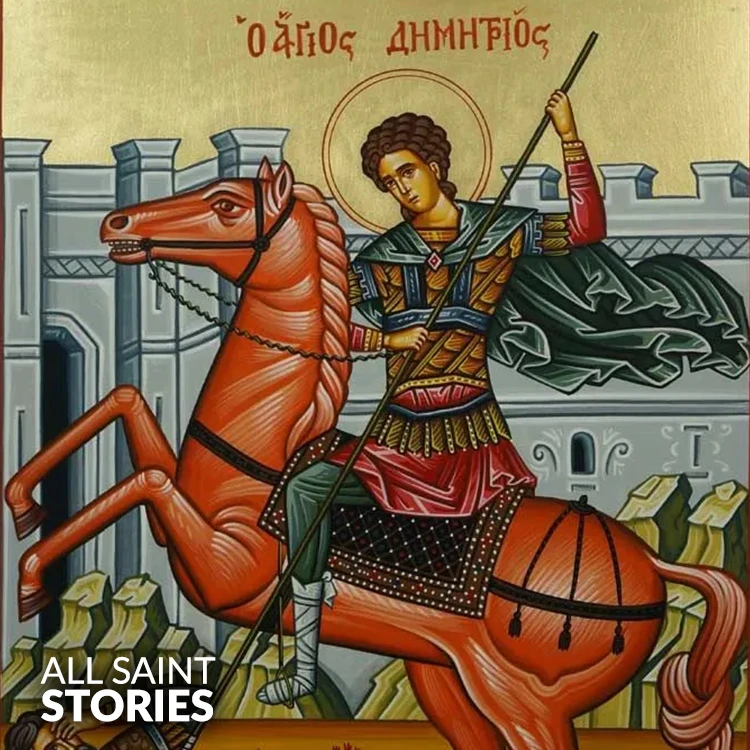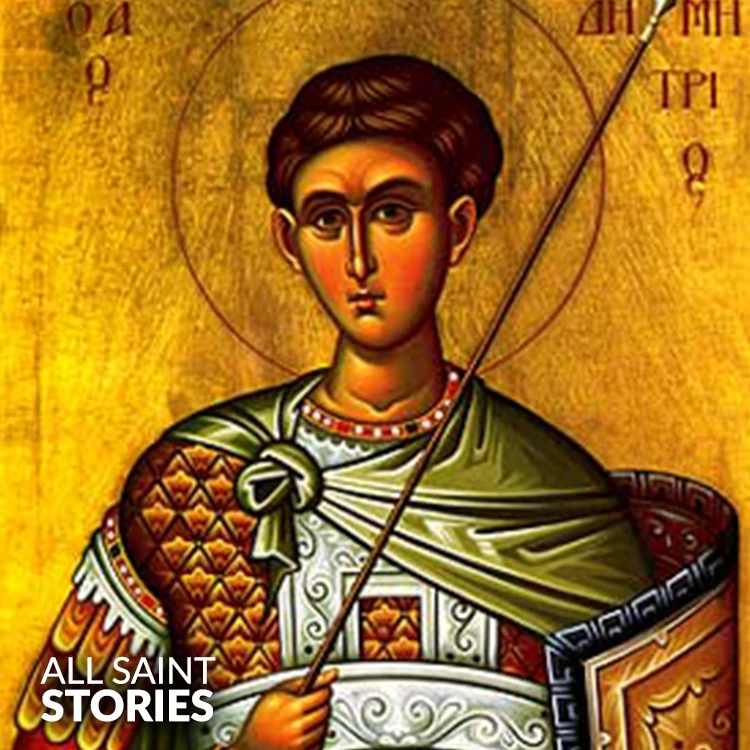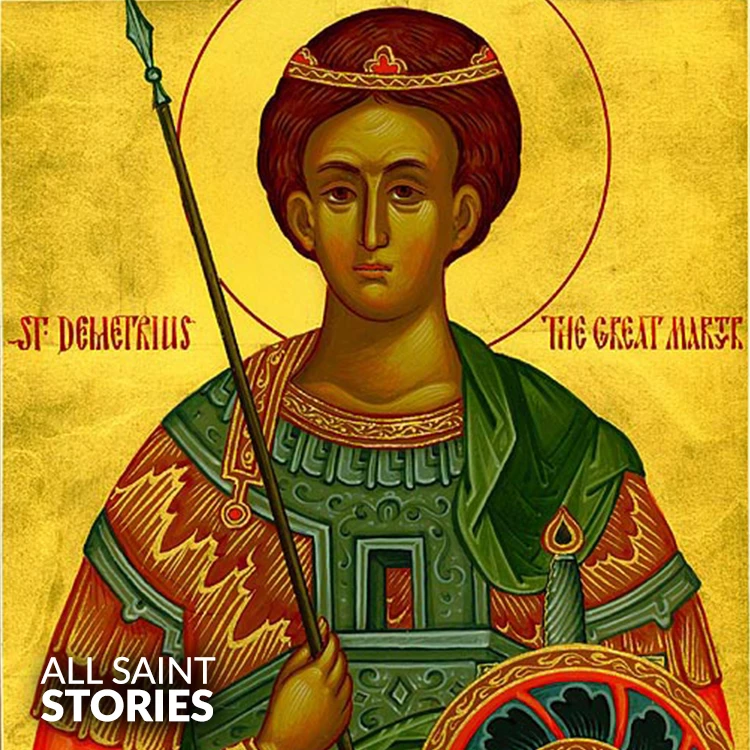"O Holy Martyr Demetrios, protector of the faithful, you who bore witness to Christ with courage and strength, intercede for us before the throne of God. Grant us the courage to live our faith boldly, the strength to face life's challenges, and the wisdom to follow Christ's path. May your example inspire us to remain steadfast in our devotion and to seek holiness in all that we do. Through your prayers, may we find peace and grace. Amen."
ST. DEMETRIOS (MARTYR)
ST. DEMETRIOS (MARTYR)

St. Demetrius of Thessalonica was a Christian martyr and soldier who suffered for his faith during the reign of Emperor Maximian. Known for his courage, he was imprisoned, tortured, and ultimately martyred by beheading. He is venerated as the patron saint of Thessalonica and soldiers.
St. Demetrius was born in Thessalonica, a prominent city in Macedonia (modern-day Greece), during the 3rd century AD. He served as a military officer in the Roman army under the rule of Emperor Maximian. Despite his position, Demetrius was a devout Christian and was known for his zealous defense of the faith.
According to tradition, during a period of Christian persecution in the early 4th century, Demetrius was arrested for refusing to renounce his faith. The emperor, angered by his refusal to worship the Roman gods, ordered that Demetrius be imprisoned and tortured. Demetrius remained steadfast in his Christian beliefs, and despite the torment he endured, he continued to witness to the truth of the Gospel.
One of the most well-known aspects of his martyrdom is his connection to a young Christian athlete named Nestor, who, encouraged by Demetrius, fought and defeated the pagan gladiator Lyaeus in a public contest. This act of defiance against paganism angered the emperor, and Demetrius was beheaded for his role in supporting the victory of a Christian. His martyrdom occurred around 306 AD.
St. Demetrius was buried in a crypt beneath the church that was later built in his honor in Thessalonica. Miracles were reported at his tomb, and his intercession was sought by those seeking healing or protection, especially by soldiers and those facing persecution.
He is often depicted in iconography as a soldier in armor, symbolizing his military background, with a spear or sword in hand, representing his martyrdom. He is the patron saint of soldiers, athletes, and Thessalonica. His feast day is celebrated on October 26 in the Eastern Orthodox Church and Roman Catholic Church.
Video Not Found
The information you see here may be either accurate or might contain some discrepancies, as it is gathered from various sources. If you believe that any part of the details about this saint is incorrect or incomplete, we kindly invite you to share your suggestions or corrections with us. Your insights are invaluable in helping us ensure that we provide the most accurate and reliable information.
We encourage you to use the form on the left to submit any corrections or additional information you may have. Whether it's a small detail or a larger correction, we will carefully review your submission and update the information accordingly. Your contributions will not only help us maintain the integrity of the content but also benefit others who seek to learn more about this saint. We greatly appreciate your assistance in making our information more accurate and complete.
Please rest assured that your personal details will remain confidential, and your suggestions will be handled with the utmost care. Together, we can ensure that the information about this saint is as accurate and informative as possible. Thank you for your time and contribution!
If you have any suggestion about ST. DEMETRIOS (MARTYR)
Your suggestion will help improve the information about this saint. Your details will not be disclosed anywhere.
© 2025 Copyright @ www.allsaintstories.com




 English
English
 Italian
Italian
 French
French
 Spanish
Spanish
 Malayalam
Malayalam
 Russian
Russian
 Korean
Korean
 Sinhala
Sinhala
 Japanese
Japanese
 Arabic
Arabic
 Portuguese
Portuguese
 Bantu
Bantu
 Greek
Greek
 German
German
 Dutch
Dutch